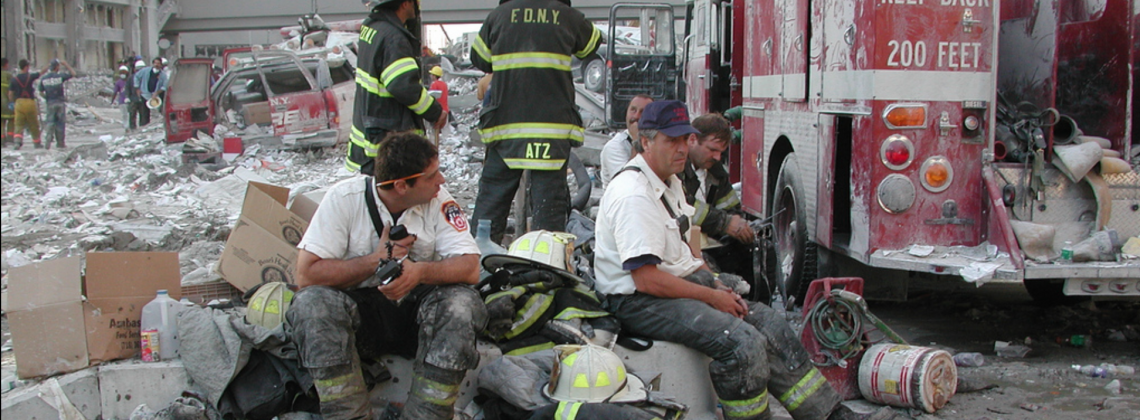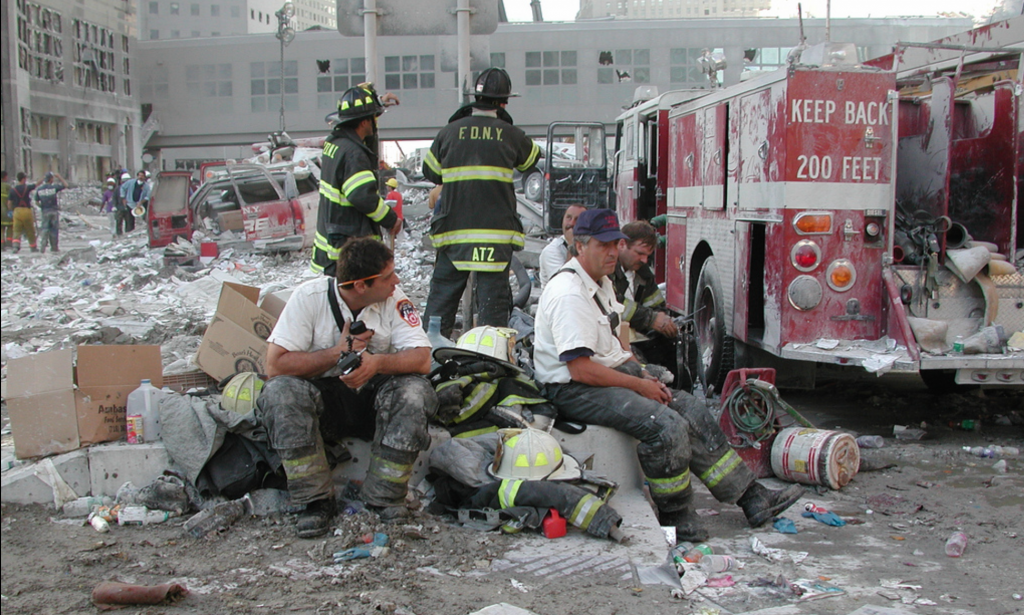

“Love and duty called you someplace higher
Somewhere up the stairs, into the fire”
- Bruce Springsteen
On September 11, 2001, I was in my office at Linwood House on the campus of Valparaiso University in northwest Indiana. It was the start of my second year in a postdoctoral program for newly minted Ph.Ds. interested in pursuing teaching careers at church-related colleges and universities.
There was no television in Linwood House, so when I saw on CNN.com that planes were flying into the World Trade Center I turned on my portable radio. A few colleagues wandered into my office to listen. The local news station was airing a feed from 1010 WINS in New York, a staple of my news consumption while growing up in north Jersey, about thirty miles from downtown Manhattan. A feeling of powerlessness came over me as I realized I was stuck in rural Indiana while friends and family back home were in danger.
I was surprised by just how many people in Valparaiso wanted to talk to me that day. One professor, who had spent time living in New York City, stopped by my office because she wanted to hear my New York (actually north Jersey) accent. A student from Long Island said the sound of my voice brought him comfort. Both were searching for ways of coping with the tragedy, ways to find solidarity with those suffering in Manhattan.
Over the course of the next several days colleagues, students, family members, and friends started asking me to expound on the “historical significance” of September 11th. I usually bumbled some incoherent comment about Pearl Harbor or why Muslim extremists hated us, but it was all a facade. I really had nothing worthwhile to say. This bothered me. Why was it so difficult for me to bring meaning to this event? After all, I had a Ph.D. I was supposed to be an intellectual, someone people consult to make sense of the world.
Twenty years later, as I reflect on those days, I realize that I had little to offer by way of commentary because I was trained to think as a historian. It was far too early for any interpreter of the past to address the question of historical significance. Historians always see the present through dark glass. Only with the passing of time does the glass grow clearer.
But my inability to provide insight went much deeper than the limits of my discipline. The terrorist attacks on 9/11 came at an important crossroads in my life. The completion of my Ph.D. studies, and my first teaching job at Valparaiso, represented the final stages of a nearly fifteen-year journey out of the American working class and into the professional world of academia. I never thought I belonged in this world. I wasn’t smart enough. I wasn’t cosmopolitan enough. I had an acute case of imposter syndrome. I still have one.
My “rise” out of the working class came with pain and loneliness. I have spent much of the last thirty years believing that I have somehow betrayed my roots. My entrance into the professional class also came with a great deal of arrogance directed at my working-class family and friends. I believed it was now my job to explain to them just how misinformed they were about the world. As I look back, my hubris was a way of coping with the profound sense of loss I was feeling as I came to grips with the fact that my life was following a different path than the one traversed by my parents and extended family.
I now realize that I would have had a lot to say in the days following the September 11th attacks if I hadn’t been so blinded by ambition and captive to the kind of narrow discourse that my new social class expected of me. In other words, the budding intellectual and recent Ph.D. had nothing helpful to offer on a day like this. But the Jersey kid raised in a community of milkmen, truck drivers, carpenters, secretaries, welders, linemen, volunteer firefighters, police officers, and mechanics was fully equipped to comment.
It all hit me about eleven months later when I listened for the first time to Bruce Springsteen’s album The Rising. Springsteen fans know the story behind the album. The Boss was driving out of a Jersey shore beach club on September 11 when another driver, recognizing the rock star, rolled down his window and yelled, “Bruce, we need you!” As I read Springsteen’s account of this story in his 2016 memoir Born to Run, I realized that I also needed the great New Jersey poet to help me make sense of the moment.
The Rising is an album about the kind of everyday heroism that comes when one sets out in pursuit of a calling. While professional chattering classes pontificated about how the terrorist attacks fit into the larger framework of U.S. foreign policy, capitalism, terrorism and relations with the Muslim world, the efforts of policemen, firefighters, and rescue workers made Springsteen think more deeply about the meaning of vocation.
Listen, for example, to the second verse of the title track, “The Rising.” Springsteen describes firefighters in their “house,” with bells ringing, preparing to head to what we must assume to be the burning World Trade Center. They are motivated by the symbol that hangs around their necks—Springsteen refers to it as “the cross of their calling.” With a clear sense of vocation and “on wings of fire,” they go “rolling down there.” Some of them will not come back.
Or listen to “Into the Fire,” the second song on the album. This tribute to the rescue workers is told as a story of vocation. It is “love and duty” that calls these workers “up the stairs” and “into the fire.” Springsteen asks us to remember their courage. He wants us to find hope and strength in their commitment to service. He wants us to learn a lesson about what it means to love our neighbors. And he repeats it over and over again just to make sure we get it:
May your strength give us strength
May your faith give us faith
May your hope give us hope
May your love give us love
If I had had any wisdom in the days following September 11, I would have encouraged those in my orbit to use the sacrifices made by the rescue workers to draw strength for the pursuit of their own callings. Now, this weekend, as we hear these stories again, I hope we use them to reflect on a better world—a world where people do their work as a means of displaying love. Not all of us are called to enter burning buildings, but we are all called to do our work in a heroic fashion.
In interviews following the collapse of the towers, rescue workers said repeatedly that they were just doing their jobs. That sums it up nicely.
John Fea is Executive Editor at Current